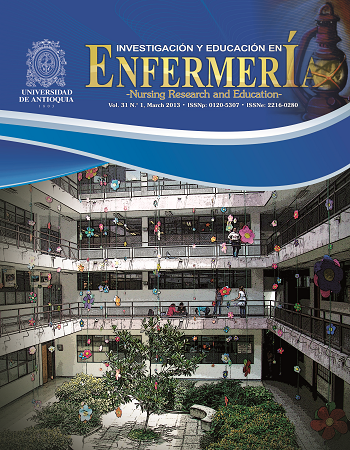Themes and situations that cause embarrassment among participants in research
DOI:
https://doi.org/10.17533/udea.iee.11649Keywords:
Bioethics; ethics, research; data collection.Abstract
Objective. To recognize the themes and situations that could make research participants feel embarrassed when questionnaires or interviews are used.
Methodoly. Quantitative and descriptive study, developed in 2008, involving a stratified sample of 1,1149 subjects who qualified the degree of shame in view of potentially embarrassing themes and situations.
Results. For the research participants, it is embarrassing to answer questions related to the following themes: betrayal (50%), physical violence (42%), sexual harassment (42%), psychological violence (40%) and death of loved ones (38%). The situations that most frequently causes embarrassment were: start of the survey or interview without requesting informed consent (83%); lack of information about the type of questions that would be addressed (79%), lack of guaranteed anonymity (78%), or use of images (66%) or a recorder (58%).
Conclusion. Themes and situations were identified that caused embarrassment among participants in research in which questionnaires or interviews were used, which should be considered in the ethical evaluation of studies.
Downloads
References
(1) Rovaletti ML. Ethical review in humanities and social sciences. Scientific research: between freedom and responsibility. Acta Bioeth. 2006; 12(2):243-50.
(2) Melo LMC. The comprehension of dental researchers about ethics in research involving in human beings [Dissertation]. São Paulo: Faculty of Dentistry, University of São Paulo; 2002.
(3) Corbin J, Morse JM. The Unstructured Interactive Interview: Issues of Reciprocity and Risks When Dealing With Sensitive Topics. Qual Inq. 2003; 9(3):335-54.
(4) La Rocca S, Martínez G, Rascio A, Bajardi M. Biomedical Investigation and informed consent in vulnerable populations and individuals. Acta Bioeth. 2005; 11(2):169-81.
(5) Aran M, Peixoto Júnior CAP. Vulnerability and bare life: bioethics and biopolitics today. Rev Saude Publica. 2007; 4 (5):849-57.
(6) Evans M, Robling M, Rapport FM, Houston H, Kinnersley P, Wilkinson C. It doesn't cost anything just to ask, does it? The ethics of questionnaire-based research. J Med Ethics. 2005;28(41):41-4.
(7) Gouveia VV, Singelis TM, Guerra VM, Santos WS, Vasconcelos TC. Self-construal and embarrassment. Psico (Porto Alegre). 2005; 36(3):231-41.
(8) Ministério da Saúde. Conselho Nacional de Saúde. Resolução n° 196, de 10 de outubro de 1996. Aprova as diretrizes e normas regulamentadoras de pesquisa envolvendo seres humanos. Diário Oficial da União (1996 Oct 16).
(9) Jorge Dias HZ, Gauer GJC, Rubin R, Valério Dias A. Psichology and bioethics: dialogues. Psicol Clin. 2007; 19(1):125-35.
(10) Reis JD, Tavares BB. Ethical issues in nursing. Analysis of ethical issues in research involving human. Nursing (São Paulo). 2004; 78(7):46-50.
(11) Archanjo DR. A debate without struggle: a discussion of divorce in Congress (Brazil 1951-1977) [Dissertation]. Curitiba: Federal University of Paraná; 2008.
(12) Dresset J, Caballero M, Juliano Y, Prieto ET, Marques JA, Fernandes CE. Study of mechanisms and factors related to sexual abuse in female children and adolescents. J Pediatr. 2001; 77 (5):413-9.
(13) Meneguel SN, Barbiani R, Steffen H, Wunder AP, Rosa MD, Rotermund J, et al. The impact of women's groups on gender vulnerability. Cad Saude Publica. 2003; 19(4):955-63.
(14) Meyer DEE, Klein C, Andrade SS. Sexuality, pleasures and vulnerabilities: educational implications. Educ Rev. 2007; 46:219-39.
(15) Andrade LS, Nóbrega-Therrien SM. The male sexuality and the vulnerability to HIV/AIDS. DST J Bras. Doencas Sex Transm. 2005; 17(2):121-6.
(16) Niconielo AP, Monteiro CZ, Assumpção MT, Lopes-Júnior C, Silva RHA, Sales-Peres A. Speech-language pathology researches: the importance of bioethics. Arq cienc saude. 2005; 12(4):200-5.
(17) Pettengill MAM, Angelo M. Family vulnerability: concept development. Rev Latino-am Enfermagem. 2005; 13(6):982-8.
(18) Domingos B, Maluf MR. Experiences of loss and mourning among school-children aged 13 to 18. Psic Reflexao Critica. 2003; 16(3):577-89.
(19) Alves DCI, évora YDM. Ethical issues linked to the professional practice of nurses that are members of a hospital infection control commission. Rev Latino-am Enfermagem. 2002; 10(3):265-75.
(20) Pessalacia JDR, Ribeiro CRO. Vulnerability and risk in research with interviews. Nursing (São Paulo). 2007; 10(114):509-13.
(21) Pessalacia JDR. Risks, impairment and damages in Bioethics: a study on the risks in research with questionnaire and/or interview [Dissertation]. Ribeirão Preto (SP):University of São Paulo at Ribeirão Preto College of Nursing; 2006.
(22) Berardineli LMM, Santos MLSC. Ethical questions in the research of nursing subsidized for audiovisual method. Texto Contexto Enferm. 2005; 14(1):124-30.
(23) Guerriero ICZ, Dallari SG. The need for adequate ethical guidelines for qualitative health research. Ciênc. saúde coletiva. 2008; 13(2): 303-11.
Published
Versions
- 2025-01-22 (2)
- 2013-04-05 (1)
How to Cite
Issue
Section
License

This work is licensed under a Creative Commons Attribution-NonCommercial-ShareAlike 4.0 International License.
Derechos de propiedad / Direitos de Propriedade
English: If the article is accepted for publication, all copyright will be of exclusive property of Investigación y Educación en Enfermería. The text and the graphics included in the publication are exclusive responsibility of the authors and not necessarily reflect the thought of the Editorial Committee.
Español: Si el artículo es aprobado para publicación, todos los derechos son de propiedad de Investigación y Educación en Enfermería. El texto y las gráficas incluidas en la publicación son de exclusiva responsabilidad de los autores y no necesariamente refleja el pensamiento del Comité Editorial.
Português: Se o artigo for aceito para publicação, todos os direitos autorais serão de propriedade exclusiva de Investigación y Educación en Enfermería. O texto e os gráficos incluídos na publicação são de responsabilidade exclusiva dos autores e não refletem necessariamente o pensamento do Comitê Editorial.















